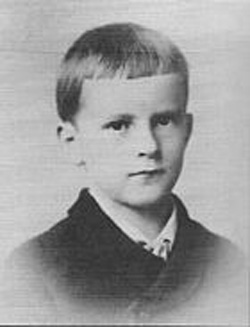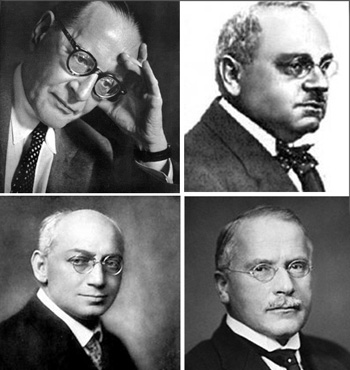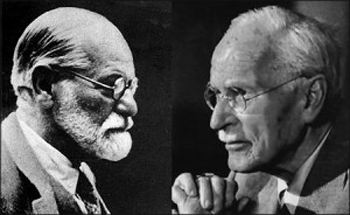Personalities
 |
 |
 |
 |
 |
 |
 |
Sigmund Freud vs. Carl Gustav Jung
We have seen how Atheism influenced Freud’s world vision. In the last article I mentioned the rupture between master and disciple based on the religious question. Jung considered religion important while Freud despised it.
Today I will focus on the studies of Jung, this famous Swiss psychologist and psychoanalyst.
 Carl Gustav Jung was born in Switzerland in the village of Kesswil near Zurich, in the year 1875. His father was a Lutheran pastor and, for this reason, he passed his childhood among books and the studies of Protestant theologians.
Carl Gustav Jung was born in Switzerland in the village of Kesswil near Zurich, in the year 1875. His father was a Lutheran pastor and, for this reason, he passed his childhood among books and the studies of Protestant theologians.
During a trip when he was still young he entered a Catholic church and became fascinated by its beauty. Later he extended this eulogy to many of the great Catholic cathedrals in Europe.
Although he had aspirations to become a minister, he eventually decided to study psychiatry and medicine and began his practice in a psychiatric hospital in Zurich in 1900. Soon afterwards he began to study the Freudian method, which was starting to gain fame.
Ernest Jones, Freud’s main biographer, affirms that Jung met personally Freud in 1906, when, after an exchange of correspondence, he went to visit him in Vienna,. Freud was 20 years older than Jung and admired the intelligence and knowledge of the Swiss youth who had just published a work of studies on normal and abnormal psychology.
He was also pleased that a non-Jew was entering the field since at that time Psychoanalysis was dominated by Jewish doctors. Freud feared that his new “science” would be labeled as “a Jewish thing,” as, indeed, some were starting to say.
So, the entrance onstage of a “German youth” with a religious formation was good news for Freud and the future of his new “science.”
 Jung soon won the full confidence of his aging master, who considered him to be his “future successor” in the field of Psychoanalysis. Along with Adler, Ferenczi, Hartmann and others, Freud and Jung built the psychoanalytical edifice until 1912.
Jung soon won the full confidence of his aging master, who considered him to be his “future successor” in the field of Psychoanalysis. Along with Adler, Ferenczi, Hartmann and others, Freud and Jung built the psychoanalytical edifice until 1912.
In 1910 Jung started to be discontent with Freud’s Atheism. The Viennese master insisted strongly that Psychoanalysis could offer a solely materialist explanation of the phenomena and mysteries of the human psyche. Without rejecting the tenets of Freud’s psychoanalysis, Jung nonetheless believed that factors unrelated to sexuality also played a role in personal development.
Since Jung had never been an atheist, he began to question Freud, and tensions increased as the time passed over the matter of the “value of religion’ for the emotional health of men.
By 1912 Freud had become upset with several of his followers, principally Adler and Jung. The old master had the habit of controlling the field with an “iron fist” and did not tolerate discordance inside his Psychoanalysis Society.
In his book Memories, Dreams and Reflections, Gustav Jung wrote that his poetic article titled the “Sacrificer” explains his rupture with Freud. In that article, as well as in others that followed, Jung wrote about the importance of religion and religiosity in men’s lives. This constituted the principal point of his disagreement with Freud’s conceptions about the structure and the functioning of the human mind.
Freud became furious. He retorted with a piece titled “History of Psychoanalysis” in which he attacked his old friends and ended by expelling them from the International Psychological Society. Between 1913 and 1914 Jung and several other known psychoanalysts were cast out of it.
Jung then founded another society – the International Analytic Psychology Society – with its seat in Zurich, Switzerland. Later branches were opened in many countries around the world.
Jung & the religious question
In frontal opposition to Freud, Jung affirmed that the nature of the human libido was not purely “sexual,” but a primary force without specific distinction or qualification. He proposed that it was an initial force that could take the direction human mind or psyche would choose.
 For Jung it is the “quest of God,” the religiosity innate to each man, that gives meaning to his existence and provides him the sensation of happiness.
For Jung it is the “quest of God,” the religiosity innate to each man, that gives meaning to his existence and provides him the sensation of happiness.
Thus, man is not just an animal seeking carnal pleasure, as Freud asserted, but a unique being on earth with a particular goal that differentiates him from the other animals. To wit: He searches for a complement to himself that can only be filled by God.
For Jung, human psyche is made of two parts: the material – the instincts and the vegetative life – and the non-material – abstract reasoning and the quest for happiness, which can only be attained in a personal encounter with God.
Jung called this process of the quest for God and happiness a “process of individualization,” that is, the unique encounter of each man with his final end, religion.
Gustav Jung never defined himself as a “convert” to any specific religion. He abandoned Protestantism and said he “marveled” over Catholic art, rituals and churches, but there is no datum that demonstrates he converted to Catholicism.
For us, what is important is to note is that Jung dared to formally oppose the asphyxiating materialism of Sigmund Freud.
Today, the majority of methods of psychological treatment include religion or “religiosity” as an important factor in the psychological healing.
The fact that serious studies were undertaken about the “religious nature of the human psyche” destroyed the severe materialist and atheistic dictatorship of Freud, which reigned absolute until Jung opposed it.
In article to come, I plan to address other factors and studies that were introduced in the field after this great controversy between Freud and Jung.
Continued

Today I will focus on the studies of Jung, this famous Swiss psychologist and psychoanalyst.

Carl Jung as a child
During a trip when he was still young he entered a Catholic church and became fascinated by its beauty. Later he extended this eulogy to many of the great Catholic cathedrals in Europe.
Although he had aspirations to become a minister, he eventually decided to study psychiatry and medicine and began his practice in a psychiatric hospital in Zurich in 1900. Soon afterwards he began to study the Freudian method, which was starting to gain fame.
Ernest Jones, Freud’s main biographer, affirms that Jung met personally Freud in 1906, when, after an exchange of correspondence, he went to visit him in Vienna,. Freud was 20 years older than Jung and admired the intelligence and knowledge of the Swiss youth who had just published a work of studies on normal and abnormal psychology.
He was also pleased that a non-Jew was entering the field since at that time Psychoanalysis was dominated by Jewish doctors. Freud feared that his new “science” would be labeled as “a Jewish thing,” as, indeed, some were starting to say.
So, the entrance onstage of a “German youth” with a religious formation was good news for Freud and the future of his new “science.”

Freud's first colleagues: clockwise from top left, Heinz Hartmann, Alfred Adler, Carl Jung & Sandor Farenczi
In 1910 Jung started to be discontent with Freud’s Atheism. The Viennese master insisted strongly that Psychoanalysis could offer a solely materialist explanation of the phenomena and mysteries of the human psyche. Without rejecting the tenets of Freud’s psychoanalysis, Jung nonetheless believed that factors unrelated to sexuality also played a role in personal development.
Since Jung had never been an atheist, he began to question Freud, and tensions increased as the time passed over the matter of the “value of religion’ for the emotional health of men.
By 1912 Freud had become upset with several of his followers, principally Adler and Jung. The old master had the habit of controlling the field with an “iron fist” and did not tolerate discordance inside his Psychoanalysis Society.
In his book Memories, Dreams and Reflections, Gustav Jung wrote that his poetic article titled the “Sacrificer” explains his rupture with Freud. In that article, as well as in others that followed, Jung wrote about the importance of religion and religiosity in men’s lives. This constituted the principal point of his disagreement with Freud’s conceptions about the structure and the functioning of the human mind.
Freud became furious. He retorted with a piece titled “History of Psychoanalysis” in which he attacked his old friends and ended by expelling them from the International Psychological Society. Between 1913 and 1914 Jung and several other known psychoanalysts were cast out of it.
Jung then founded another society – the International Analytic Psychology Society – with its seat in Zurich, Switzerland. Later branches were opened in many countries around the world.
Jung & the religious question
In frontal opposition to Freud, Jung affirmed that the nature of the human libido was not purely “sexual,” but a primary force without specific distinction or qualification. He proposed that it was an initial force that could take the direction human mind or psyche would choose.

The role of religion in men's psychology
separated Jung from Freud
Thus, man is not just an animal seeking carnal pleasure, as Freud asserted, but a unique being on earth with a particular goal that differentiates him from the other animals. To wit: He searches for a complement to himself that can only be filled by God.
For Jung, human psyche is made of two parts: the material – the instincts and the vegetative life – and the non-material – abstract reasoning and the quest for happiness, which can only be attained in a personal encounter with God.
Jung called this process of the quest for God and happiness a “process of individualization,” that is, the unique encounter of each man with his final end, religion.
Gustav Jung never defined himself as a “convert” to any specific religion. He abandoned Protestantism and said he “marveled” over Catholic art, rituals and churches, but there is no datum that demonstrates he converted to Catholicism.
For us, what is important is to note is that Jung dared to formally oppose the asphyxiating materialism of Sigmund Freud.
Today, the majority of methods of psychological treatment include religion or “religiosity” as an important factor in the psychological healing.
The fact that serious studies were undertaken about the “religious nature of the human psyche” destroyed the severe materialist and atheistic dictatorship of Freud, which reigned absolute until Jung opposed it.
In article to come, I plan to address other factors and studies that were introduced in the field after this great controversy between Freud and Jung.
Continued

Posted February 5, 2020
______________________
______________________





